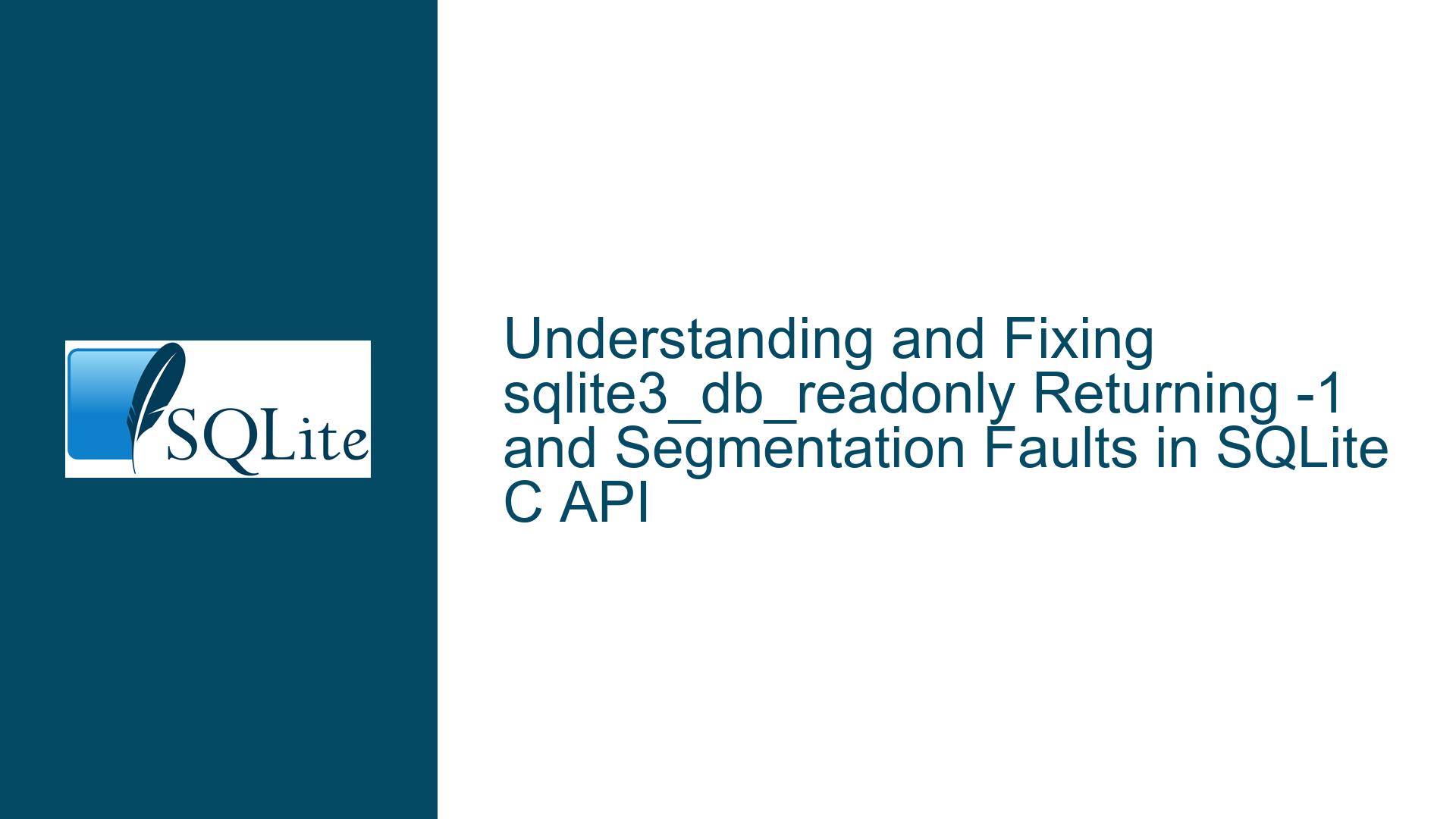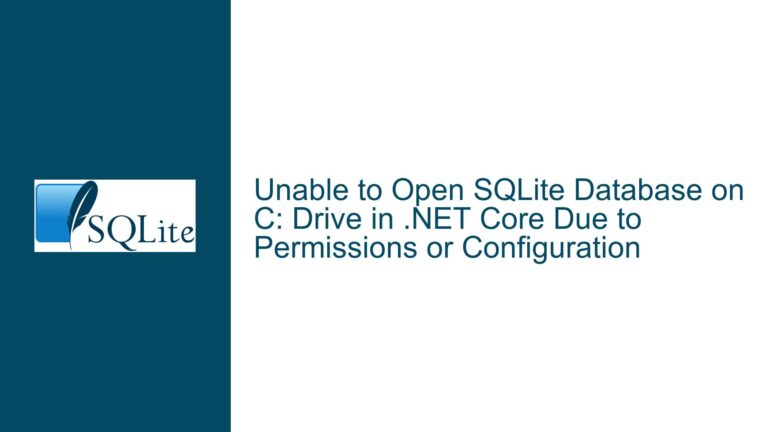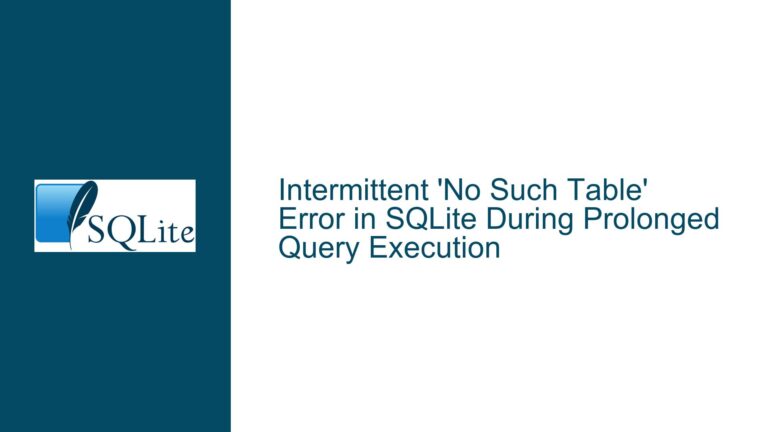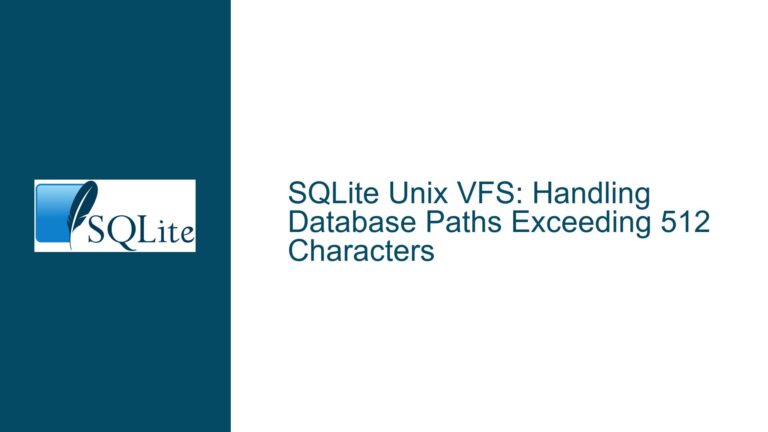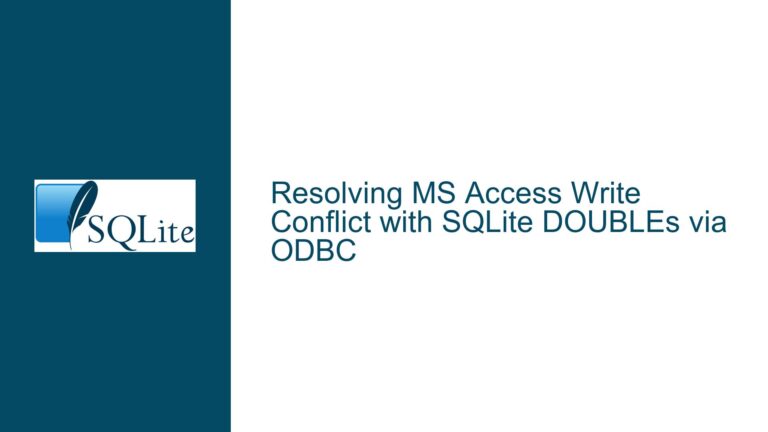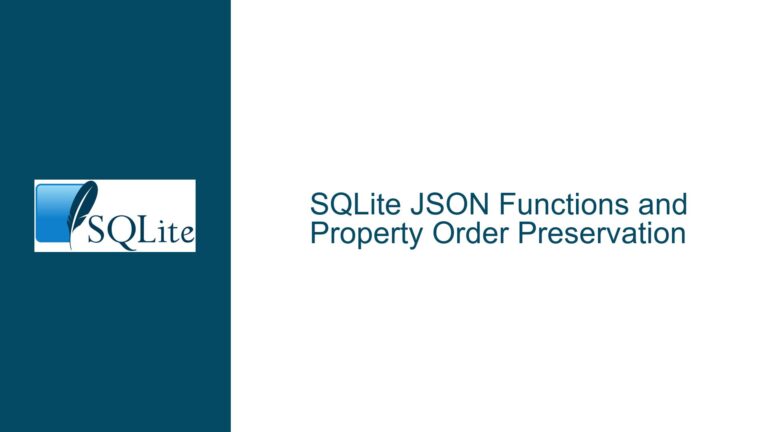and Fixing sqlite3_db_readonly Returning -1 and Segmentation Faults in SQLite C API
Issue Overview: sqlite3_db_readonly Returns -1 and Program Crashes with Segmentation Fault
The core issue revolves around the use of the SQLite C API function sqlite3_db_readonly, which unexpectedly returns -1 instead of the expected boolean values 0 (writable) or 1 (read-only). This issue is compounded by a segmentation fault that crashes the program. The segmentation fault is a critical error indicating that the program attempted to access an invalid memory location, often due to improper handling of pointers, array indices, or incorrect function arguments.
The sqlite3_db_readonly function is designed to determine whether a specific database attached to a SQLite connection is read-only. It takes two arguments: a sqlite3* connection handle and a const char* schema name (e.g., "main", "temp", or an attached database name). The function returns 1 if the database is read-only, 0 if it is writable, and -1 if an error occurs, such as an invalid schema name or an invalid database connection.
In the provided code, the function is called with the database file path (DBF) as the second argument instead of a valid schema name. This misuse of the function leads to the -1 return value. Additionally, the segmentation fault is likely caused by incorrect array indexing in the sqlite3_bind_text calls, where the program attempts to access memory beyond the bounds of the values array.
Possible Causes: Misuse of sqlite3_db_readonly and Array Indexing Errors
Incorrect Second Argument in
sqlite3_db_readonly
The primary cause of the-1return value is the misuse of thesqlite3_db_readonlyfunction. The second argument must be a valid schema name, such as"main"for the primary database or"temp"for the temporary database. Passing the database file path (DBF) as the second argument is invalid and results in the function returning-1to indicate an error.Array Indexing Errors in
sqlite3_bind_textCalls
The segmentation fault is likely caused by incorrect array indexing in thesqlite3_bind_textcalls. In C, array indices start at0, but the provided code uses indices starting at1to access thevaluesarray. This results in accessing memory beyond the bounds of the array, leading to undefined behavior and a segmentation fault.Potential Issues with Database File Location and Permissions
While not directly related to the-1return value or segmentation fault, the location and permissions of the database file can also cause issues. If the database file is stored on an external drive or a directory with restricted permissions, the program may fail to open the database or perform write operations. However, in this case, thesqlite3_open_v2call succeeds, indicating that the database file is accessible.Compilation and Linking Issues
Although less likely, improper compilation or linking of the SQLite library could contribute to runtime errors. Using the correct compilation flags and ensuring that the SQLite amalgamation or pre-built library is correctly linked is essential for avoiding undefined behavior.
Troubleshooting Steps, Solutions & Fixes: Resolving sqlite3_db_readonly Errors and Segmentation Faults
Step 1: Correct the Second Argument in sqlite3_db_readonly
To resolve the -1 return value, ensure that the second argument passed to sqlite3_db_readonly is a valid schema name. For the primary database, use "main" as the schema name. Here is the corrected code snippet:
printf("%d\n", sqlite3_db_readonly(db, "main"));
This change ensures that the function checks the read-only status of the primary database correctly. If the database is writable, the function will return 0; if it is read-only, it will return 1.
Step 2: Fix Array Indexing in sqlite3_bind_text Calls
To prevent the segmentation fault, correct the array indexing in the sqlite3_bind_text calls. In C, array indices start at 0, so the values array should be accessed using indices 0 to 3. Here is the corrected code:
sqlite3_bind_text(stmt, 1, values[0], -1, SQLITE_STATIC);
sqlite3_bind_text(stmt, 2, values[1], -1, SQLITE_STATIC);
sqlite3_bind_text(stmt, 3, values[2], -1, SQLITE_STATIC);
sqlite3_bind_text(stmt, 4, values[3], -1, SQLITE_STATIC);
This ensures that the program accesses valid memory locations and avoids undefined behavior.
Step 3: Verify Database File Location and Permissions
Although the sqlite3_open_v2 call succeeds, it is good practice to verify that the database file is stored in a writable location and that the program has the necessary permissions to access it. If the database file is on an external drive, ensure that the drive is mounted correctly and that the file path is valid. Use the following code to check for errors when opening the database:
rc = sqlite3_open_v2(DBF, &db, SQLITE_OPEN_READWRITE, NULL);
if (rc != SQLITE_OK) {
fprintf(stderr, "Cannot open database: %s\n", sqlite3_errmsg(db));
sqlite3_close(db);
return 1;
}
This code prints an error message if the database cannot be opened, helping to identify issues with file location or permissions.
Step 4: Use Debugging Tools to Identify Runtime Errors
To diagnose and resolve segmentation faults, use debugging tools such as gdb (GNU Debugger). Compile the program with debugging symbols enabled using the -g flag:
gcc -g -o my_program my_program.c -lsqlite3
Run the program under gdb and reproduce the segmentation fault:
gdb ./my_program
When the program crashes, use the bt (backtrace) command to view the call stack and identify the source of the error:
(gdb) bt
This provides detailed information about the state of the program at the time of the crash, helping to pinpoint the exact location of the error.
Step 5: Ensure Proper Compilation and Linking of SQLite
To avoid runtime errors, ensure that the SQLite library is correctly compiled and linked. If using the SQLite amalgamation, include the sqlite3.c file in the compilation:
gcc -I. -o my_program my_program.c sqlite3.c -lpthread -ldl -lm
If using a pre-built SQLite library, ensure that the correct library is linked:
gcc -o my_program my_program.c -lsqlite3
Verify that the SQLite version used during compilation matches the version installed on the system.
Step 6: Test the Program with Corrected Code
After making the necessary corrections, test the program to ensure that the sqlite3_db_readonly function returns the expected value and that the program no longer crashes with a segmentation fault. Here is the complete corrected code:
#include <stdio.h>
#include "sqlite3.h"
#define DBF "path/to/dbfile"
int main() {
sqlite3* db;
const char* values[4] = {"Ana", "str", "0720", "ana.oa"};
char* sql;
int rc;
sqlite3_stmt* stmt;
rc = sqlite3_open_v2(DBF, &db, SQLITE_OPEN_READWRITE, NULL);
if (rc != SQLITE_OK) {
fprintf(stderr, "Cannot open database: %s\n", sqlite3_errmsg(db));
sqlite3_close(db);
return 1;
}
printf("Database open result: %d\n", rc);
printf("Database read-only status: %d\n", sqlite3_db_readonly(db, "main"));
sql = "INSERT INTO ids (name, adr, tel, email) VALUES (?1, ?2, ?3, ?4);";
rc = sqlite3_prepare_v2(db, sql, -1, &stmt, NULL);
if (rc != SQLITE_OK) {
fprintf(stderr, "Failed to prepare statement: %s\n", sqlite3_errmsg(db));
sqlite3_close(db);
return 1;
}
sqlite3_bind_text(stmt, 1, values[0], -1, SQLITE_STATIC);
sqlite3_bind_text(stmt, 2, values[1], -1, SQLITE_STATIC);
sqlite3_bind_text(stmt, 3, values[2], -1, SQLITE_STATIC);
sqlite3_bind_text(stmt, 4, values[3], -1, SQLITE_STATIC);
rc = sqlite3_step(stmt);
if (rc != SQLITE_DONE) {
fprintf(stderr, "Failed to execute statement: %s\n", sqlite3_errmsg(db));
}
sqlite3_finalize(stmt);
sqlite3_close(db);
return 0;
}
This code includes error checking for database operations and ensures that the sqlite3_db_readonly function is called correctly. By following these steps, you can resolve the -1 return value and segmentation fault issues, ensuring that your program functions as intended.
